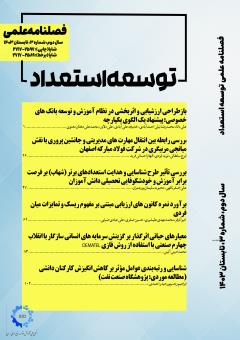عوامل حیاتی اثرگذار برگزینش سرمایههای انسانی سازگار با انقلاب صنعتی نسل چهارم با استفاده از روش DEMATEL فازی
محورهای موضوعی : تئوری ها و مدل های نوین آموزش و توسعه منابع انسانی
1 - دانشجوی دکترا، دانشکده علوم اقتصادی و اداری، دانشگاه لرستان ،لرستان ، ایران
کلید واژه: صنعت نسل چهارم, دیماتل فازی, شرکتهای دانشبنیان.,
چکیده مقاله :
پژوهش حاضر هدفی سه وجهی دارد که عبارتاند از: اول، شناسایی معیارهای جدید برای انتخاب کارکنان در محیط صنعتی نسل چهارم. دوم؛ اولویتبندی و مشخص کردن روابط علی بین این معیارها. سوم، کمک به ادبیات مدیریت عملیات با تمرکز بر روند استخدام و حمایت از فعالیتهای منابع انسانی با توجه به معیارهای مرتبط با صنعت نسل چهارم. نوع پژوهش حاضر، كاربردی و ازنظر روش تحقیق توصیفی- علی و در شرکتهای دانشبنیان با تکنولوژی پیشرفته انجامشده است. جامعه آماری شامل 5 نفر از کارشناسان شرکتهای مربوطه بوده که مسئولیت انجام تحول در جهت سازگاری با انقلاب صنعتی نسل چهارم را در شرکت خود بر عهده داشتند. جهت اجرای تحقیق از رویکرد DEMATEL فازی استفادهشده است. بر اساس یافته ها، یازده عامل حیاتی اثرگذار جهت انتخاب نیروی کار در محیط صنعتی نسل چهارم شناسایی شد که مهمترین آنها به ترتیب اولویت شامل؛ توانايي برخورد با پیچیدگی و حل مسئله، تفکر در مورد فرآیندهای همپوشان و انعطافپذیری برای انطباق با نقشها و محیط کاری جدید میباشند. علاوه براین، نتایج حاکی از وجود عوامل علی، به ترتیب نزولی شامل: دانش فناوری اطلاعات و تولید فنآوری، آگاهی از امنیت فناوری اطلاعات و حفاظت از اطلاعات، توانایی برطرف نمودن بحرانهای کاری و چگونگی ترکیب دانش مربوطه و استفاده از آن در یک شغل یا فرآیند خاص میباشند. عوامل نتیجه نیز شامل؛ انعطافپذیری برای انطباق با نقشها و محیط کاری جدید، تحلیلگری و مهارت ادراک بالا، توانایی برقراری ارتباط با واسطههای جدید، توانایی برخورد با پیچیدگی و حل مسئله، تفکر در مورد فرآیندهای همپوشان، یادگیری و همکاری مداوم بینرشتهای و اعتماد به فنآوریهای جدید و آمادگی تغییر می باشند.
The present study has a three-dimensional purpose, which is: First, to identify new criteria for selecting employees in the fourth generation industrial environment. Second; Prioritize and identify causal relationships between these criteria. Third, contribute to the operations management literature by focusing on the recruitment process and supporting human resource activities according to industry-related criteria of the fourth generation. The type of research is applied and descriptive-causal research method and has been done in knowledge-based companies with advanced technology. The statistical population consisted of 5 experts from the relevant companies who were responsible for making changes in order to adapt to the fourth generation industrial revolution in their company. The fuzzy DEMATEL approach has been used to conduct the research. Based on the findings, eleven critical factors influencing the selection of labor in the fourth generation industrial environment were identified, the most important of which, in order of priority, include; Ability to deal with complexity and problem solving, thinking about overlapping processes, and flexibility to adapt to new plans and work environments. In addition, the results indicate the existence of causal factors in descending order, including: information technology and technology production, awareness of information technology security and information protection, the ability to resolve work crises and how to combine relevant knowledge and use it in a job or They are a special process. Outcome factors also include; Flexibility to adapt to new plans and work environments, high analytics and perceptual skills, ability to communicate with new intermediaries, ability to deal with complexity and problem solving, thinking about overlapping processes, continuous interdisciplinary learning and collaboration, and confidence in new technologies and readiness for change Are.
